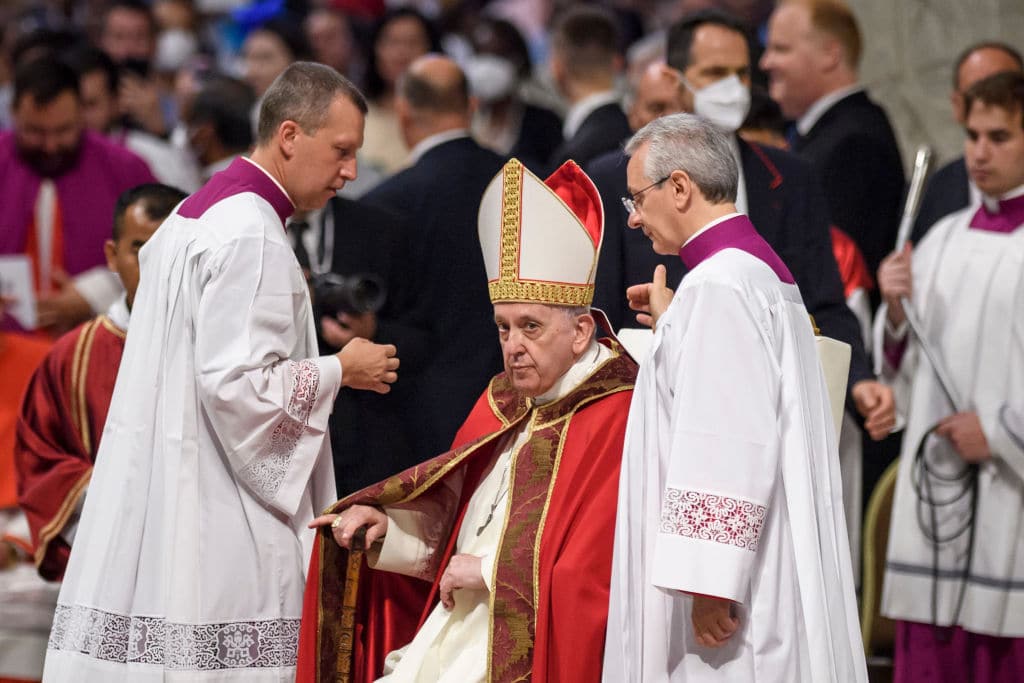Pope warns about Synodal Path as German Catholicism collapses
The Holy See issued a statement on Thursday, warning that Germany’s ‘Synodal Path’ – a movement designed to give lay members a say in the running of the Catholic Church – lacks the authority to instruct bishops on doctrine or morality, and warned of the dangers of splitting the Church. In a statement issued by The post Pope warns about Synodal Path as German Catholicism collapses appeared first on Catholic Herald.

The Holy See issued a statement on Thursday, warning that Germany’s ‘Synodal Path’ – a movement designed to give lay members a say in the running of the Catholic Church – lacks the authority to instruct bishops on doctrine or morality, and warned of the dangers of splitting the Church.
In a statement issued by the Vatican, the Holy See warned that the Synodal Path cannot make doctrinal decisions, clarifying that the initiative underway in Germany “does not have the power to oblige bishops and the faithful” to “new ways of governance and new approaches to doctrine and morality.”
The statement said: “It would not be lawful to initiate in the dioceses, prior to an agreed understanding at the level of the universal Church, new official structures or doctrines, which would represent a wound to ecclesial communion and a threat to the unity of the Church.”
The statement went on to cite the words of Pope Francis contained in his Letter to the Pilgrim People of God in Germany: “the universal Church lives in and of the particular Churches, just as the particular Churches live and flourish in and from the universal Church. If they find themselves separated from the entire ecclesial body, they weaken, rot and die. Hence the need always to ensure that communion with the whole body of the Church.”
The Synodal Path is a series of conferences of the German Catholic Church to discuss a range of contemporary theological and organisational questions, as well as possible reactions to the abuse crisis in the Church in Germany. The Synodal Path’s supreme body is the Synodal Assembly, consisting of 230 members, and made up of clerics, as well as lay members from the Central Committee of German Catholics.
The Synodal Path is divided into four Forums focused on power and separation of powers in the Church; life in succeeding relationships; priestly existence, and the role of women. An ongoing discussion is the relationship or precedence between the Synodal Path and the international ‘Synod on Synodality’, commenced by Pope Francis in 2021.
The Synodal Path commenced in 2019 and is scheduled to end in 2023. A majority at the conference held in February endorsed women’s ordination, same sex partnerships getting a public blessing, reforming teachings on sexual ethics, and allowing married priests.
According to National Catholic Register, in 2019, the Synodal Assembly signalled its intent to challenge Church doctrine and discipline, and vowed to issue “binding” teaching on a range of matters. There are concerns now that the Church in Germany is moving toward schism, although Bishop Georg Bätzing of Limburg – head of the German bishops’ conference – has insisted “we are not schismatics”.
Pope Francis wrote a letter to German Catholics in 2019, objecting to the course of action. Also in 2019, Cardinal Marc Ouellet – prefect for the Congregation for Bishops – wrote to Cardinal Reinhard Marx, then-president of the German bishops’ conference, to report that the Pontifical Commission for Legislative Texts’ legal assessment of the draft statutes for the Synodal Assembly determined that the proceedings had no binding authority.
In March 2021, the “Fundamental Text” asserted that “there is no one truth of the religious, moral, and political world, and no one form of thought that can lay claim to ultimate authority.” Meanwhile, the outgoing president of the lay Central Committee of German Catholics – Thomas Sternberg – dismissed the Vatican’s concerns as “disturbances from Rome.”
Despite this liberal drift, the German Church has suffered from a devastating decline, a trend seen across western Europe. The German Catholic Church has seen hundreds of thousands of members officially resign their membership. According to the German bishops’ conference, at least 359,000 Catholics left the church in 2021, a jump from the 221,390 who left in 2020.
In historically Catholic Bavaria, 14,035 people left the Church in the first half of 2022 in Munich alone, almost double the number for the same period in 2019. Meanwhile, data revealed that only 4.3 per cent of Catholics said they go to church most Sundays. The secular trend is also impacting Protestants. While fifteen years ago, 61 per cent of Germans belonged to either a Catholic or Protestant church, in 2011 only about 26 per cent of Germans are officially registered as Catholics, with 23.7 per cent Protestants.
Against this decline and the liberal direction of some Catholics in western Europe, the Church is seeing massive growth in central and eastern Europe, leaning into more conservative and traditional ideology. The progressive direction of the Synodal Path therefore would seem counterintuitive given what appears to be driving the Church forward in much of Europe.

The post Pope warns about Synodal Path as German Catholicism collapses appeared first on Catholic Herald.














